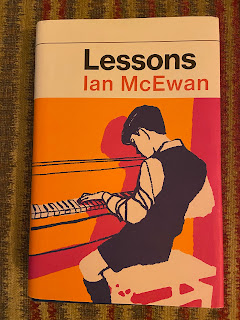'Twilight in Delhi' by Ahmed Ali
Now this wasn't a book I'd have chosen; it was a book group choice what can I tell you, but if you want to find out about what it was like to be a muslim in Delhi at the end of the empire, this book certainly puts you in the picture.
It communicates the sights and sounds very evocatively, from the cooking smells to the gritty baking heat of the loo and the beggars calling daily for alms. I've never been to India, but I'm guessing it captures it well. It also portrays the inflexibility of the caste system which denotes from birth, a person's place in society which they cannot aspire to better. It also, rather wearyingly, details the subjugation of women, where it is better for a woman to marry a man disfigured both mentally and physically by a gunshot injury, so that family pride can be maintained, rather than back out because the match is unsuitable.
Asghar, the focal point of readerly interest, manages eventually to get the marriage match of his choice, and when he tires of her, neglects her, until she gradually fades away from tuberculosis, I for one, was relieved that his second choice of wife was denied him by some quick match-making manouvering by her family.
And whilst I might have given the plot away a little, there really isn't much of a plot to convey. It's less a story and more a window onto a particular time period and culture, from which the majority Hindu population are noticeably absent. It also has too many characters to realistically keep track of and annoying poetry inserts that don't contribute, other than as a badge of the author's learning. I skipped most of them.
So if you want a bit of escapism, a sense of historic Delhi and a really slow, descriptive read, then you'll enjoy this book. However, I didn't find it particularly engrossing and I wouldn't read it again, although I will probably keep the book and use some of the passages for teaching purposes.
Verdict: Don't read.
It communicates the sights and sounds very evocatively, from the cooking smells to the gritty baking heat of the loo and the beggars calling daily for alms. I've never been to India, but I'm guessing it captures it well. It also portrays the inflexibility of the caste system which denotes from birth, a person's place in society which they cannot aspire to better. It also, rather wearyingly, details the subjugation of women, where it is better for a woman to marry a man disfigured both mentally and physically by a gunshot injury, so that family pride can be maintained, rather than back out because the match is unsuitable.
Asghar, the focal point of readerly interest, manages eventually to get the marriage match of his choice, and when he tires of her, neglects her, until she gradually fades away from tuberculosis, I for one, was relieved that his second choice of wife was denied him by some quick match-making manouvering by her family.
And whilst I might have given the plot away a little, there really isn't much of a plot to convey. It's less a story and more a window onto a particular time period and culture, from which the majority Hindu population are noticeably absent. It also has too many characters to realistically keep track of and annoying poetry inserts that don't contribute, other than as a badge of the author's learning. I skipped most of them.
So if you want a bit of escapism, a sense of historic Delhi and a really slow, descriptive read, then you'll enjoy this book. However, I didn't find it particularly engrossing and I wouldn't read it again, although I will probably keep the book and use some of the passages for teaching purposes.
Verdict: Don't read.


Comments
Post a Comment